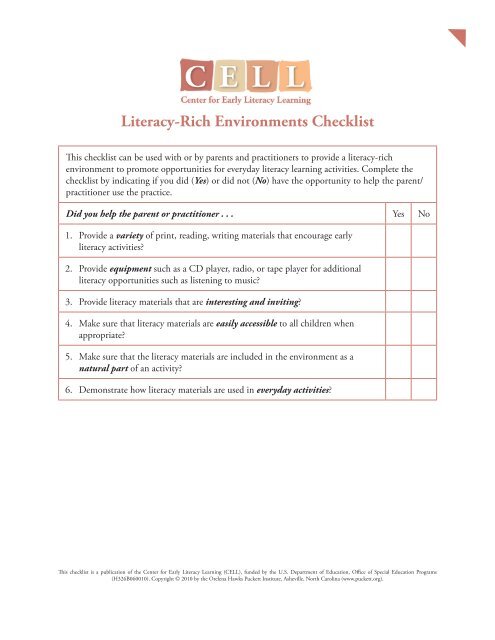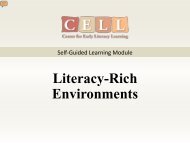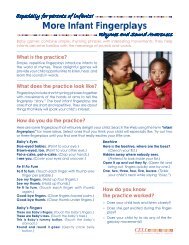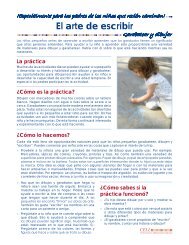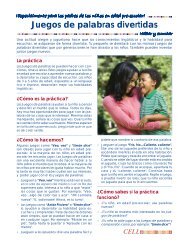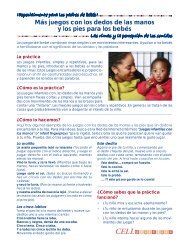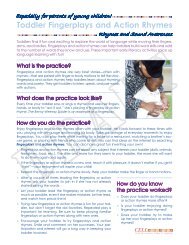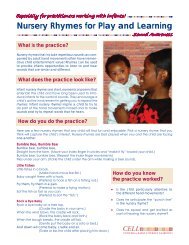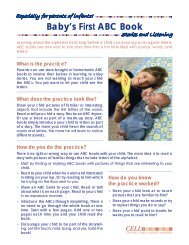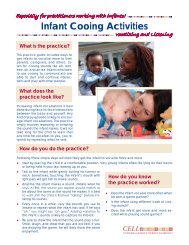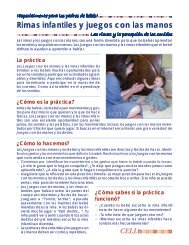Literacy-Rich Environments Checklist - Center for Early literacy ...
Literacy-Rich Environments Checklist - Center for Early literacy ...
Literacy-Rich Environments Checklist - Center for Early literacy ...
Create successful ePaper yourself
Turn your PDF publications into a flip-book with our unique Google optimized e-Paper software.
Caregiver Responsive Teaching <strong>Checklist</strong>This checklist can be used with or by patents and practitioners to identify the key features ofusing responsive teaching to support a child’s early <strong>literacy</strong> learning. Complete the checklist byindicating if you did (Yes) or did not (No) have the opportunity to help the practitioner/parentuse the practices.Did you help the parent or practitioner . . . Yes No1. Engage the child in interest-based family or classroom early <strong>literacy</strong> learningactivities?2. Use different materials or arrange the environment to engage the child inusing early <strong>literacy</strong> behaviors in new and different ways?3. Provide the child the time to initiate interactions with people or objects in theactivities?4. Pay attention to and notice when and how the child uses or tries to use early<strong>literacy</strong> behaviors in interactions with people and objects in the everydayactivities?5. Respond promptly and positively to the child’s use of early <strong>literacy</strong> behaviors inways that match the amount, pace, and intent of the child’s behavior?6. Respond to the child’s use of early <strong>literacy</strong> behaviors with comments, joining inthe interactions, and gestures to support child engagement in the activity?7. Respond to the child in ways that encourage the child to use early <strong>literacy</strong>behaviors in new and different ways?8. Encourage the child to elaborate on his or her use of early <strong>literacy</strong> behaviorsin ways that are increasingly more complex?This checklist is a publication of the <strong>Center</strong> <strong>for</strong> <strong>Early</strong> <strong>Literacy</strong> Learning (CELL), funded by the U.S. Department of Education, Office of Special Education Programs(H326B060010). Copyright © 2010 by the Orelena Hawks Puckett Institute, Asheville, North Carolina (www.puckett.org).
Participatory Adult Learning Strategy (PALS) <strong>Checklist</strong>This checklist includes questions <strong>for</strong> you to consider when helping a parent or practitioner useinterest-based everyday child early <strong>literacy</strong> learning activities. It helps you be sure you are usingall the steps of an adult learning process that has been found effective in helping a parent orpractitioner feel confident in using interest-based everyday learning practices. The checklist can becompleted by indicating if you did (Yes) or did not (No) have the opportunity to help the parentor practitioner use the practice.Were you able to do each of the following during your time together with theparent or practitioner . . .1. Introduce in<strong>for</strong>mation about the model component or practice and itsimportant features?2. Provide examples, demonstrate, or otherwise illustrate <strong>for</strong> the parent orpractitioner what the practice looks like?3. Involve the parent or practitioner in actively trying out and doing the practice?4. Assist the parent or practitioner in examining what was done, what happened,and what worked when the practice was implemented?5. Determine what the parent or practitioner understood and the extent to whichthe trainee was able to use the practice?6. Determine what additional opportunities will be provided to build upon theparent’s or practitioner’s understanding and use of the practices?YesNoThis checklist is a publication of the <strong>Center</strong> <strong>for</strong> <strong>Early</strong> <strong>Literacy</strong> Learning (CELL), funded by the U.S. Department of Education, Office of Special Education Programs(H326B060010). Copyright © 2010 by the Orelena Hawks Puckett Institute, Asheville, North Carolina (www.puckett.org).
Adaptations <strong>Checklist</strong>This checklist includes questions <strong>for</strong> you to consider when helping a parent or practitioner createadaptations that enhance a child’s participation in everyday <strong>literacy</strong> learning activities. Complete thechecklist by indicating whether you had (Yes) or did not have (No) opportunities to help the parent orpractitioner use the practice.Did you help the parent/practitioner: Yes No1. Observe the child to ensure that all early <strong>literacy</strong> materials are accessible based onthe child’s abilities?2. Observe the child to determine the challenges to the child’s ability to participate inearly <strong>literacy</strong> activities?3. Reflect on what challenges the child may face when participating in early learningopportunities with his/her peers?4. Modify the physical environment to maximize a child’s ability to participate andexplore independently?5. Modify the activity to enhance the child’s active participation in all aspects of theactivity?6. Modify early <strong>literacy</strong> materials to maximize a child’s ability to easily manipulate andexplore?7. Modify instructional procedures to enhance the child’s participation?8. Provide any necessary physical assistance as a last resort?9. Remember that adaptations work best in activities that are based on the child’sinterest?This checklist is a publication of the <strong>Center</strong> <strong>for</strong> <strong>Early</strong> <strong>Literacy</strong> Learning (CELL), funded by the U.S. Department of Education, Office of Special Education Programs(H326B060010). Copyright © 2010 by the Orelena Hawks Puckett Institute, Asheville, North Carolina (www.puckett.org).


